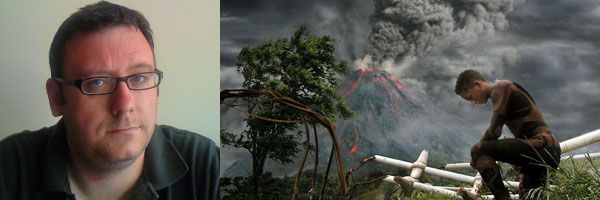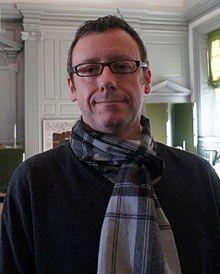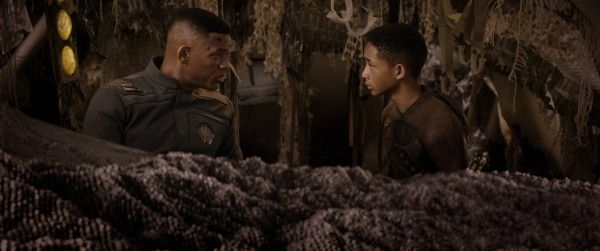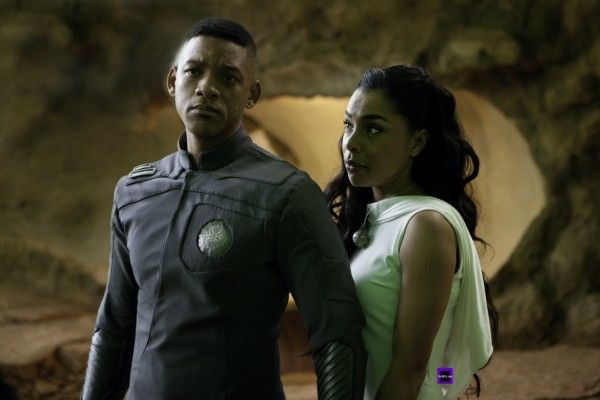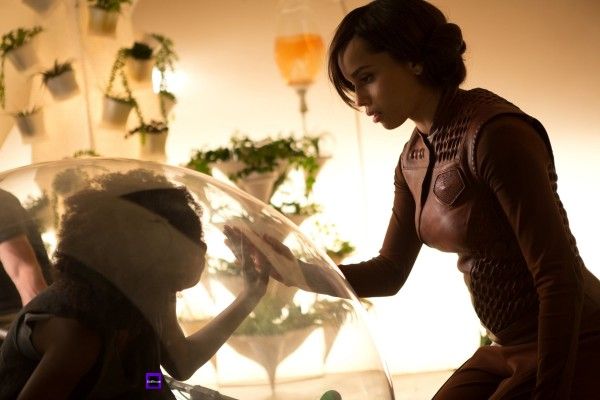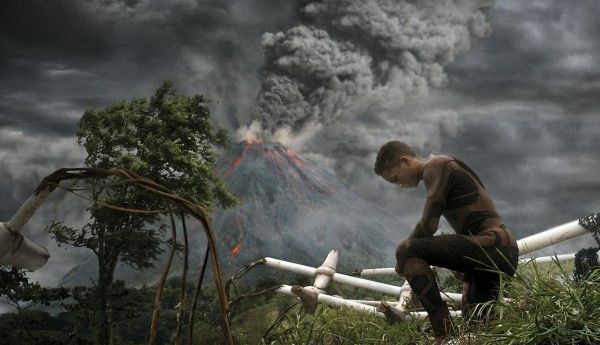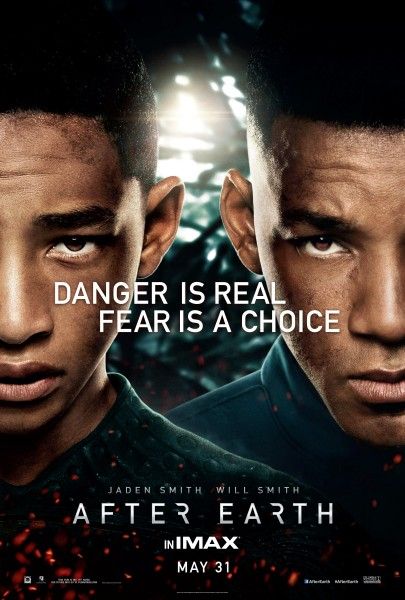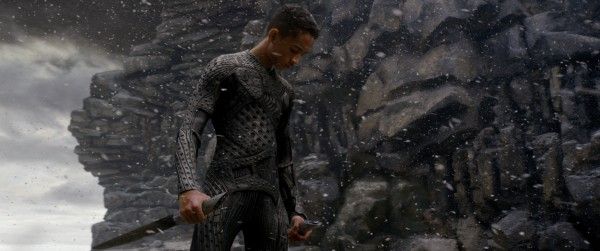With director M. Night Shyamalan’s After Earth opening this weekend, Sony Pictures invited us to the Virgin Galactic Spaceport in New Mexico for the press junket. As you can imagine, it was an amazing place to talk about the movie. If you’re not familiar with the plot, After Earth stars Will Smith and Jaden Smith as a father and son who crash land on a post-apocalyptic Earth, and it’s up to the son to fight for survival when the father is seriously injured. For more on the film, watch three clips and some behind-the-scenes footage. After Earth also stars Sophie Okonedo and Zoe Kravitz.
During our exclusive interview with screenwriter Gary Whitta, he talked about how the project came together, how the story changed during production, the father-son dynamic, how Hollywood doesn't make many films aimed at younger teenagers, his experiences working on the live-action Akira movie and what was his take on the story, future projects, and a lot more. Hit the jump for what he had to say.
Collider: I noticed in the credits last night that Will Smith came up with the idea for the film. How did all this germinate?
Gary Whitta: Yes, totally legit. I think this is actually the first movie that Will has a story credit on. I wasn’t on any of his other movies, but to me, it feels like [there’s more] of his DNA in this that any movie he’s ever made. It was his original idea, he had a little one-page premise; not a lot of meat on the bones, but it was his original idea, and they wanted a writer to help him develop it. So they sent me the little logline and I went away and built the world out a little bit and pitched it to him. We developed it together, and then I went away and wrote the script. So the way the writing credits broke down, I think, is actually totally representative—story by Will Smith, and [director M. Night Shyamalan] and I wrote the screenplay together.
From what you read in that one-pager to what we see onscreen, how close is it to what Will pitched?
Whitta: Well, the original pitch that he had was literally a paragraph. And it was so broad that… it was something like, “A thousand years after humanity has been forced to abandon Earth and go live someplace else, a father and a son who are having a strained relationship crash-land on Earth, which has now become this inhospitable place.” And I thought, well, there’s a lot I can do with that; I can really build that out. So I went back and pitched with him. The final movie still totally conforms to that original description. The very first version that I pitched to Will was very different to what we eventually made, because through development, it changes and morphs a lot, and you always want to hone it and make it better. But a lot of Will’s DNA is in there and a lot of mine is in there. But certainly the movie that he set out to make, I think he made it.
It is very much a father-son movie, and what’s really cool about it is that it’s a positive father and son story, mixed with sci-fi—it has a lot of things going for it that you wouldn’t expect. When did it become a father-son dynamic?
Whitta: What’s interesting is that it wasn’t even a sci-fi movie at first. I don’t know if you’ve heard this story, but it was originally a much smaller movie. Will and Jaden played a military father and son, but it was present-day. And they were on a trip into the Alaskan wilderness, like a fishing trip, and the car went off the road. Same as the story today: Will’s badly hurt, Jaden has to go and get rescue, and he gets chased by Grizzly bears and wolves. It was like The Grey, a much more grounded version.
But of course, Will being Will, at some point said, “You know what? Let’s blow this out.” Then it became a big science-fiction movie, and then it came to me. It was a father-son story first and a science-fiction story second. And when I was sitting around with Will in the early days of developing the story, he would always say, “Let’s never lose sight of the fact that this is a father-son story first.” Will has done so many big science-fiction blockbusters, that I think he almost takes that for [granted], because he knows that the CG is going to be there, he knows that the world is going to look amazing and we’re going to build this incredible world out around the story. But he always said, “The movie lives… when the camera is on me and Jaden and we’re just having that relationship.” So we always tried to imagine, when we’re talking about the father-son aspect of the story, that we stripped all the science fiction away; we tried to remember that we’re telling the version of it where they were just in the car in Alaska. I always feel that even a big science-fiction story has to work just as a human, emotional story first. You have to be able to take away all the science fiction gimmicks, and the story can still stand on its own, as just a universal story about, in this case, a family. We tried to always stay true to that, and hopefully, I feel like the movie still works on that level first—a father-son story first and [then] a science fiction story.
It’s nice to have all that great fun, but I became a father during the process of making this movie, and I get it now. I’m like, “Oh yeah. This is fathers and sons really [going] out of their way to be there for one another.” And when they put us with those military families [for research], and I learned about that dynamic, a lot of the material came out of that. Will was always very big on this idea, that the whole movie is leading up to that salute, where he finally shows Jaden that… the kid has earned his respect. And that moment is still there in the movie. I think, first and foremost, we’ve told a father-son story. I call it “Smith Family Robinson,” I think it’s actually like an old-fashioned family adventure [and] they don’t make those movies any more. Science fiction and summer movies have become—especially after Chris Nolan had such huge success with Batman by taking it really gritty and dark—everything has to be gritty and dark now; Star Trek is gritty and dark, Superman is gritty and dark, and don’t get me wrong, I love those movies. But it’s nice to have more than one flavour. I think if the movie stands out this summer it’ll be because it isn’t part of that arms race, it isn’t part of the the big explosive escalation that we’ve seen over the summer. This movie kind of operates on its own level. It’s more contemplative, it’s quieter, and it never forgets that it’s a human story first.
Was there a longer cut of the movie?
Whitta: I saw a very early rough cut, and not much changed. But I had a very different experience when I saw the final film. Because, you know what it’s like—the rough cut that I saw had no visual effects in it. So when Jaden sees all those monkeys, that’s a bunch of guys with Ping Pong balls, and I can’t get with this; it takes me out of the movie. I need to see the more complete version. [But] the only thing they really changed is, we always felt like the movie really begins when you get to the crash. That’s really the big inciting incident. So we actually had more on Nova Prime; I think they felt that the movie was a little slow in getting to the real big action opening of the film, so they condensed the opening of the movie and just got to the crash more quickly. I think it’s like 100 minutes, the final running time; and again, a lot of movies this summer are like 220. I think it’s a more lean, more efficient… like I said, [more of] a simple story than some of these more expansive…
What’s also interesting about this movie is that it’s going after an audience that is really underserved by Hollywood, which is a 12-15 year old, younger teenaged crowd. And I’m not saying that it’s just to be enjoyed by that audience, but that audience doesn’t get quality movies like this aimed at them anymore. When I was growing up, I had Goonies…
Whitta: Right, what happened to those movies?
They don’t make them anymore. So was that something that the studio/Night/Will sort of identified, saying, “We can really make a movie for an age group that’s been underserved”?
Whitta: I don’t think that was the mission statement. I think it organically came out of the fact that we knew Jaden was going to be the real star of the movie, and that his audience is primarily teenaged boys and girls. So obviously you’re not going to do an R-rated movie, because it shuts those kids out. But over the course of developing it, I think we slowly caught on to the fact that, yeah, we’re making almost like the old-fashioned, throwback adventure movie; almost like those old Disney adventure movies that you don’t see anymore. And certainly, the movie’s pretty intense; it’s definitely earned a PG-13, it’s scary in places. But I do think, like I’ve said, you cannot even take your kids to see Batman anymore; what the hell is that about? I love those movies, but they’re no longer… kids love Batman, but that movie is over their heads. Other than the animated movies that are coming out this summer, there’s very few things out there that are genuinely appropriate for teenaged kids and families. And hopefully we’ll hit that spot.
We just did that panel, and you guys were talking about how, if the film’s a hit, there’s always the possibility of a sequel. Have Will and Jaden talked about their interest in that? How serious do you think that is?
Whitta: I always think that, you don’t want to count your chickens. I mean, who knows how the movie’s going to do? It’s a very crowded, competitive summer. I’m proud of the fact that we’re one of the few original movies this summer—it’s basically us, Pacific Rim, and Elysium. Everything else is superheroes, comic books, sequels. Like I said, I’m proud of that fact, but it’s a bigger challenge to get people to understand what the movie is. Who knows how the movie is going to do? I think it’s going to do well, but I don’t think anyone’s going to pull the trigger on a sequel or a TV show until they see how the movie does. But certainly they want to be prepared. When you’ve got the biggest movie star in the world in your movie, you don’t rule anything out. You like to think it would be a success. And in building the mythology, we haven’t written ourselves into a corner; if we want to do a sequel, the foundation certainly is already built.
What else are you working on right now?
Whitta: I just finished writing a spec, which hopefully if [After Earth] does well, then maybe that’s a good little boost for getting a new piece of work out there. I’m working on a couple of TV projects, and I’m very, very close to something that… Oh my God, it’s so cool; if I told you what it was, you’d be like “Oh my God.” But I seriously can’t. Maybe in a couple of weeks. But I’m working on something that is so awesome… I’m hoping they’re going to announce it soon. It’s so badass.
So basically, you’ve been working on it with the studio, but it hasn’t leaked yet…
Whitta: It’s not official. And it hasn’t leaked, thank God. But I’m hoping, all things going well, that we’ll have something to reveal pretty soon. It’s very cool, very much up your stream.
Yeah, I can tell by the way you’re talking. And I definitely want to ask you, before I run out of time, what was your experience like working on Akira?
Whitta: I worked on it for about six months. And I pretty much lived on the lot with the director at the time, Ruairi Robinson, trying to work out that movie. It’s a tough movie; it’s hard to figure out how to do it below an R-rating. It’s a difficult movie, which deals with very mature subject matter; it’s hardcore. I hope they figure out how to make it. My experience on it… I’ll just say I learned a lot about the realities of studio filmmaking. My friend Albert Hughes was on it after me; and they’ve had numerous writers come and go. Some movies are just trickier to crack than others, and I hope they crack it, because I would love to see them get it right. But I understand why it’s difficult.
Well, it’s one of those things where, if it could be made for $50 million, then of course they could do an R. But it’s at least $100 million to make, and maybe even $150 million.
Whitta: I’ll give you a little something that’s actually never been spoken about before. How interesting it is, I’ll let you decide. But we always dealt with the problem of, [and] I think what a lot of the fans felt was problematic, was the westernization of it; [it’s like] “they’re never going to make the $100 million movie with an all-Japanese cast. You need to westernize it.” And that almost became kind of a joke—like, the idea of Shia LeBeouf as Tetsuo or whatever. People are going to have a hard time with that, and certainly the fans.
So we came up with an idea that I actually thought was really cool; I don’t know if it survived into future versions. It’s not New Manhattan—because that was the [initial] idea, right? They moved it in to New Manhattan. I said, it’s not New Manhattan, it’s still New Tokyo but—this is going to sound weird—it’s actually in Manhattan. What we did was, the idea is that there’d been a massive economic crash in the United States and in our desperation, we sold Manhattan Island to the Japanese, who were becoming a very powerful economic force, and they were having an overpopulation problem, because Japan is a series of islands, it can only accommodate so many people. So they just bought Manhattan Island, and it became the fifth island of Japan, and they populated it. It became New Tokyo, and it was just off the coast of the United States. So it was Japanese territory, it wasn’t New Tokyo, but there were Americans who kind of lived in little Americanized quarters of it. I felt it was a way to do a kind of cool Western-Eastern fusion of the two ideas; not fully Japanese, not fully westernized. Whether or not you’ll ever see that version, I don’t know, but I thought that was kind of a cool solution to that problem of westernization of a Japanese concept.
Either way, expensive as hell to bring to the screen…
Whitta: How do you do it? I think rather than try to figure out how you do an R movie for a number, it was more about “Let’s get it to a PG-13 and then we can spend the money we need to make.” But that has its own problems. Again, I would love to see them make it; I have all the good will in the world for that movie. I understand why it’s been difficult for the studio to make a movie that they feel can be true to the subject matter but also economically make sense for them.
It’s so tricky because you and I understand what’s going on. But the average person who doesn’t really understand how movies are made is like “This is a no-brainer.” But the fact is, the rating equals how much money you can spend. It’s just statistics…
Whitta: And sometimes it’s just not the right time. I always feel like, when you’ve got a piece of material, it will always find a way to get made. Movies are dead for a long time, and then they come back and they find the right time for them. One of the difficulties when I was working on Akira is that Watchmen was coming out around that time. It came out, and it wasn’t a huge hit. It was successful, but I don’t think it was what the studio hoped it would be. And it’s a similar thing, right? Difficult, mature graphic novel that’s not Superman; it’s something only the fans really know about. New York gets destroyed, it’s very uncompromising. And I think they looked at that and said, “Well, why would we want to do exactly that again?” I think that was part of what complicated it.
So, like I said, I had a great time working on it. I got to sit in rooms where we got to design the bike, and you have those days where you’re like, “You know what? This is why this is still the coolest job in the world.” Even with all the aggravation and all the frustrations that you have, you get to sit around and say, “What does Kaneda’s bike look like in this version of the movie?” And we had the concepts, we built some of the models and it’s like, this still a badass job to do.
I really hope one day they can figure it out. Anyway, switching back to other things, what’s it like for you when you’re writing a spec script? Are you looking at the marketplace in terms of, maybe there’s something I can work with here. Or are you more like, “I came up with a cool idea, I’m going to write it and let’s see what happens?”
Whitta: It’s the latter, and I think that’s the only creatively honest way to do it. And it’s the only way that also makes sense if you actually want to succeed. There’s a lot of people out there that chase trends. Remember when torture porn like Saw and Hostel was the biggest thing? Everybody went away and wrote those movies. Everyone in the last two years is writing the teen vampire movies. The problem is, the market moves so quickly and trends come and go so fast that by the time you get your movie out there, people have moved on to the next thing. You have to be the next thing, not try to copy the current thing. I always find that I can only write the movie that I’m writing right now. It may not have the most commercial concept in the world, but if you’re trying to copy the success of other movies, you’re never going to get anywhere. I would like to think that, [with Book of ] Eli, certainly there wasn’t any post-apocalyptic trend in movies at the time; that was a story that I wanted to tell and I felt like it had enough originality to it that it felt like a creatively honest thing for me to write. And it was a success. The idea that somebody sees Pacific Rim and tries to go away and do something like that, I think is route one to failure. You have to be [Pacific Rim screenwriter] Travis Beacham; you have to come up with the idea for Pacific Rim, not the movie that tries to be like Pacific Rim.
After Earth opens this weekend.

